Taiwanese student’s memory in Japan! “I will be back as a doctor”-Peter Chen, (NCKU) “医師として戻って来ます ” -陳沛享 (台湾国立成功大学)
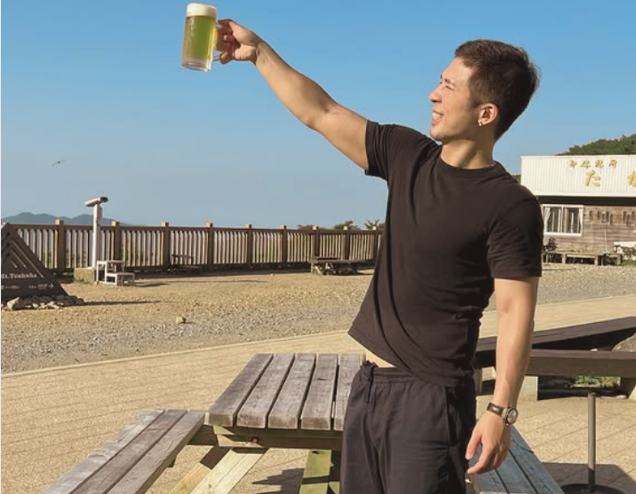
筑波山頂で飲むビール (Beer at the top of Mt. Tsukuba)
At the beginning of 2023, I set foot in Japan for the very first time. Unlike Taiwan’s tropical and humid climate, the winter at the University of Tsukuba was so freezing that I had to bundle up in a thick down jacket. The vegetation was different from back home, and the animals on campus were not the same as those in Taiwan. Most memorably, I was often awakened in the mornings by the cawing of crows.
2023年の初めて、日本の地を踏みました。熱帯で蒸し暑い台湾とは異なり、冬の筑波大学は気温が低く、厚手のダウンコートが必要でした。植生も台湾とは違い、キャンパス内にいる動物たちの顔ぶれも大きく異なります。特に朝になると、カラスの鳴き声で目を覚ますことがよくありました。
With respect to infrastructure, Tsukuba City, known as the “Science City,” and the University of Tsukuba itself left a deep impression on me. Whether it was JAXA’s rockets and space technology or the Proton Beam Therapy Center at Tsukuba Hospital for cancer therapy, I found myself constantly reflecting on Taiwan’s development in these fields—both in terms of quality and quantity—and wondering where we Taiwanese could strive further.
「研究学園都市」と呼ばれる筑波市、そしてその中にある筑波大学は、当時の私に大きな衝撃を与えました。JAXAのロケットや宇宙開発設備、筑波病院の陽子線センターによるがん治療など、どれもが台湾のこれらの分野の発展について、「質」と「量」の両面から、どこをさらに努力できるのかと考えさせられました。
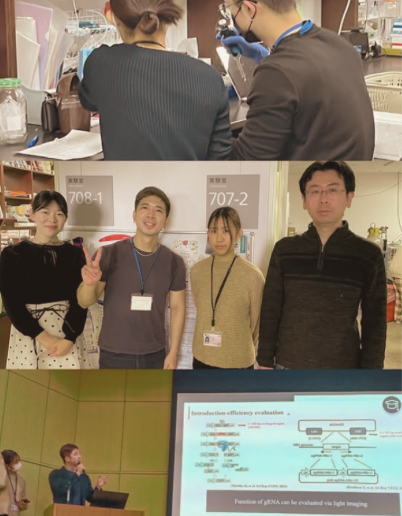
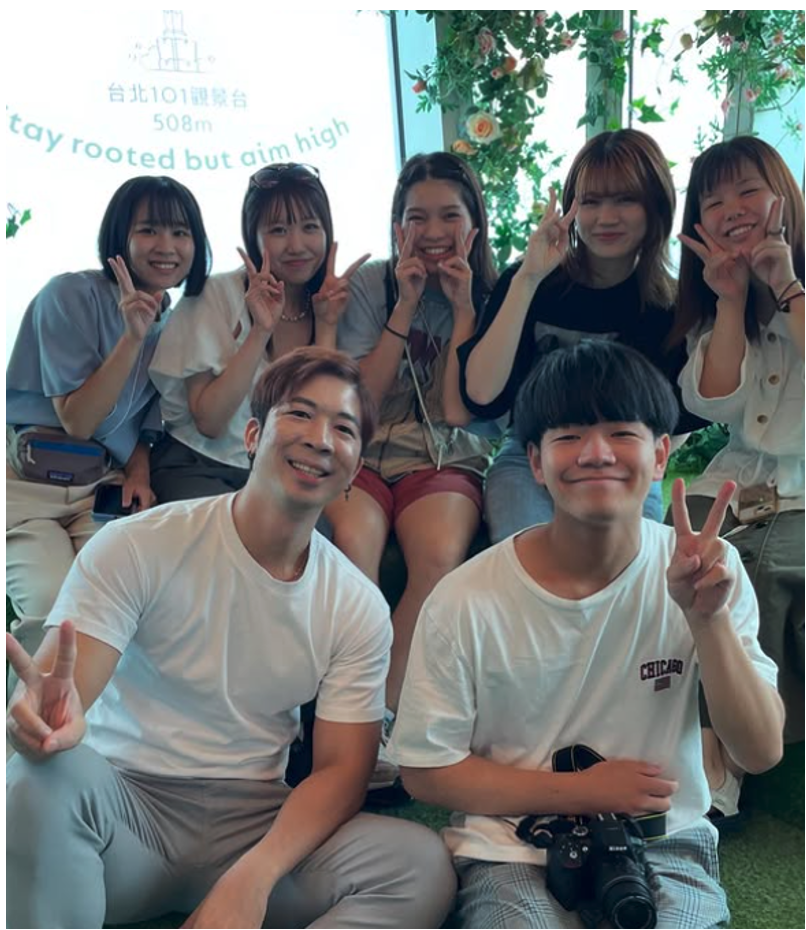
(Left) At the lab at the University of Tsukuba (Right) Support for students from the University of Tsukuba who participated in NCKU program.
左)筑波大学のラボのにて 右)筑波大学から成功大学プログラムに参加した学生のサポート
Japan, with its rich history and deep connections to Taiwan, shares many similarities with my homeland. Nevertheless, through observing club activities and interacting with students at the University of Tsukuba, I sensed many differences. If I were to sum them up in two words, they would be “reserve” and “perseverance.” Japanese students tend to be more reserved than their Western counterparts, expressing their thoughts less openly in public, yet their minds are full of ideas and inspirations. Their perseverance shows in their approach to unfamiliar languages like English; even if they are not confident, they practice repeatedly and bravely present in front of others.
一方で、日本は豊かな歴史を持ち、台湾と深いつながりのある国です。共通点も多いですが、サークル活動の見学や筑波大学の学生たちとの交流を通じて、多くの違いも感じました。二つの言葉で表すなら、「内向的」と「粘り強さ」でしょう。日本の学生たちは、欧米の学生に比べて公の場で自分の考えを表現することは少ないですが、実は心の中には豊かな発想やインスピレーションを持っています。また、英語のような慣れない言語に対しても、得意でなくても何度も練習し、発表の場に立つ姿勢に粘り強さを感じました。
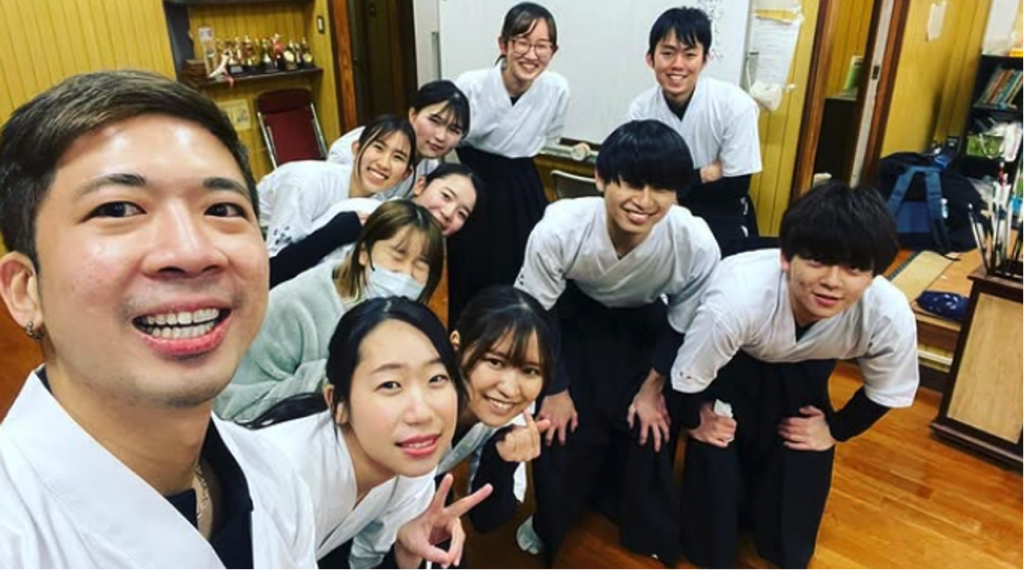
At the Kyudo Club (弓道部にて)
After coming to Japan and beginning to learn Japanese, I realized that the country is far more than the surface impressions held by tourists—complicated transportation systems, rich ramen flavors, or cheap tax-free medicines. Looking deeper, I observed how the Japanese steadily work toward their goals, invest heavily in scientific development, and tirelessly cultivate their cultural influence. These are the aspects of Japan that have truly amazed me over the past three years.
日本の地を踏み、日本語を学び始めてから、私は日本が観光客の目に映る「複雑な交通システム」「濃厚なラーメンの味」「免税で安い薬」といった表面的なイメージだけの国ではないことを強く感じました。もっと深く観察すると、日本の人々は目標達成のために着実に努力し、科学の発展に資金を惜しまず投じ、自国の文化的影響力を高めるために絶えず努力していることに気づきました。これらは、過去三年間で私が驚きをもって見てきた日本の姿です。
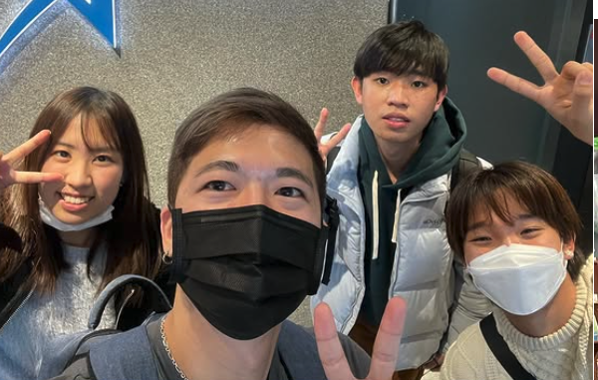
As I prepare for my internship at Tsukuba Hospital at the end of this year, I hope to further explore both the humanities and sciences in Japan, and to internalize these experiences as energy for my future journey as a doctor.
そして今年の年末、筑波病院での実習を控え、私は「文」と「理」それぞれの側面から日本をさらに深く見つめ、将来医師となる自分の糧にしていきたいと願っています。
さくらサイエンスプログラムについて→ TJMS
GASSHUKU
Proton Beam Therapy Center at Tsukuba Hospital
Frontier Medical Science Program


